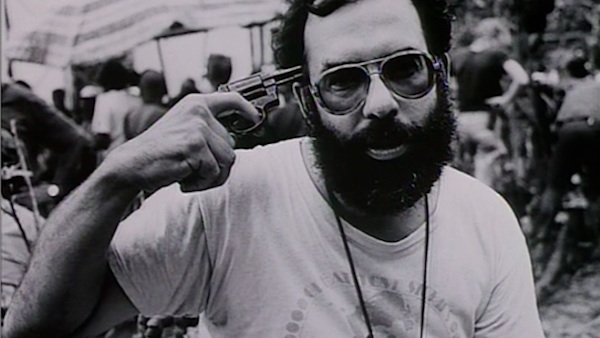Hearts of Darkness starts with filmmaker Francis being interviewed by reporters about his recent film called Apocalypse Now concerning the Vietnam War. In that interview, he states that he and his crew, during the making of this film, suffered similar kinds of insanity and mental stress that the soldiers in the Vietnam War had to go through. In his tone, he was certain that this was necessary for this gigantic film in terms of its theme and for it to be a cultural phenomenon and the filmmaking milestone that it is now.
So now the question must be asked, was Francis saying all of this because he went through it and had to justify it in a way? In other words, were the problems he faced was something that he embraced along the way as production went on or something he predicted and subconsciously wanted when he took on such an ambitious and high-budgeted film?
Apocalypse Now had a lot of problems during its production. Each of them slowly and gradually ate away at Francis and led to a very stressful mental state not unlike the stress we feel as directors but on a completely different level. The first major problem was the replacement of Harvey Keitel. I cannot imagine the mental fortitude required to replace your lead after months of planning and pre-production. That might as well have been the final straw for many people. I’m impressed that Francis and his crew soldiered on without any animosity. The second problem was the recalling of the helicopters that Francis borrowed from the Philippines military as part of their contract to film in their country. When Francis chose The Philippines as the location for Apocalypse Now, he did so because of the similarity in the terrain with Vietnam but at the time he must have known about the rebels who were not far away from where the shooting was happening. During the bombing scene with Robert Duvall’s character, it is quite apparent in the documentary that shots were being ruined by this helicopter problem. The crew was on edge. This was the start of their own apocalypse. Francis’s insistence on not stopping the shoot is what probably made the crew feel at ease and made them remember their priorities. Then there was the weather problem, Martin Sheen’s heart attack and the ever so looming un-fitting ending. Francis found a path through all these problems, something that I admire and respect in a director but it’s not the implementation that I find interesting but the mental trail which led to the solution.
Francis said something about the weather that stuck with me. He said, “I’m sure they had heavy rain too” and he proceeded to adapt the scene in the rain. I think filmmaking in essence is adapting. At every stage, the film goes through an irreversible evolution and there’s no better epitome of this than Francis Ford Coppola’s Apocalypse Now. At one point, Francis started changing and adding dialogues and scenes the day before the shoot. Why was this happening? The one thing that I have learned from filmmaking and this documentary is that the story remains constant, but we cannot do anything about the erratic change in our minds. Sometimes it makes sense, and it works and other times it makes sense, but it doesn’t work. The story of the Apocalypse Now didn’t change in the middle of the shooting, but as Francis’s problems grew and Martin started to associate his personality with Willard’s, scenes took a different shape and dialogues had to change. This led to Francis solving the ending problem and I believe without all these problems he would not have come upon or even considered the buffalo-killing ritual a viable option. He saw himself in that ending scene, he saw the film’s ending in that ending scene.
So, did it work? It certainly did. If he intended these types of conditions, a sense of self-sacrifice, which I don’t believe he did, I think the only other question that remains would be of ethics which I am unable to answer. If he didn’t intend it and adapted his way through all the problems he faced, then I would go on to say that without those problems we wouldn’t have this masterpiece of a film. As a filmmaker, I believe there will always be that one film that we have subconsciously chosen as a massive challenge in our career because it is the only way we can create a good film, a film that will reduce us to nothingness and one that will require everything from us.

Leave a Reply